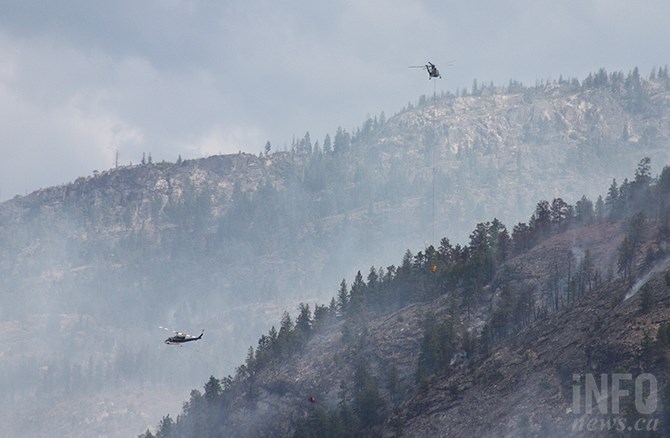
FILE PHOTO - Helicopters fly over the Christie Mountain wildfire, Aug. 20.
Image Credit: Steve Arstad
September 28, 2020 - 7:00 AM
As B.C.’s population grows and the climate changes, a UBC expert says more intense, untamable wildfires like those south of the border should be expected.
UBC forestry professor Lori Daniels and her friend, a researcher from the University of California, visited the Thompson-Okanagan two years ago. He told her the Okanagan looked like the California of his youth.
“If B.C. can learn anything from California, it would be to ensure that as our population grows… we need to think very carefully how we’re going to live in these flammable landscapes. We should be planning neighbourhoods to be fire smart. We should be thinking about how some parts of the Okanagan, even close to town, might be too steep and too dry and fire-prone to put houses there, safely, in the long term,” she said.
When building roads, there should be roads that go both in and out so people don’t become trapped in cul-de-sacs in the event of a fire and landscaping and building should be done with considerations to wildfire, Daniels said.
Wildfire mitigation work to remove dry tinder and brush to prevent wildfires is also key.
With Penticton’s Christie Mountain wildfire, thinning of the forest in the area ahead of time meant that firefighters were able to get into neighbourhoods and were able to protect homes, Daniels said, adding that the forested areas that were not mitigated were scorched.
READ MORE: Penticton's Christie Mountain wildfire being held
Wildfires currently devastating large parts of California, Oregon and Washington burn hotter and faster with a drier climate than B.C.
“Their typical summer conditions are more like our hot, dry, summer conditions,” she said.
Millions of hectares are being burned in the United States, which is currently recording its worst wildfire season on record. The previous records for hectares burned in America were recorded in 2017, which was broken again in 2018 and 2019, Daniels said. B.C. also recorded record-breaking numbers for area burned in both 2017 and 2018.
READ MORE: Communities still recovering one year after worst fire season on record in B.C.
In California, 95 per cent of ignitions are human-caused, but in B.C. between 45-50 per cent of fires are caused by people, she said. With a growing population, “we’re going to increase the chances of people lighting fires, either accidentally or through negligence,” she said.
Wildfires in the south also currently impact more people because of population density with more people living in wildfire interface zones, she said. There are 39 million people in California, while B.C. has five million, according to census data.
B.C. has been good at putting out fires previously, but fires are burning under hotter and drier conditions than ever before, meaning fires are spreading faster and having greater impacts, despite all of the technology we have to fight fires, she said.
“What I thought my kids would be managing is what our generation is managing right now. This is what climate change looks like,” she said.
“In 2017 we broke 85 temperature records in B.C... between the end of June and the first week of September…. We look at that parallel in California and California was breaking temperature records for much of the month of August.”
B.C. wildfires are only expected to get worse.
“More areas are being affected by hot, dry, extreme weather. This is the pattern that we’re on… since the 1980s,” Daniels said.
To contact a reporter for this story, email Carli Berry or call 250-864-7494 or email the editor. You can also submit photos, videos or news tips to the newsroom and be entered to win a monthly prize draw.
We welcome your comments and opinions on our stories but play nice. We won't censor or delete comments unless they contain off-topic statements or links, unnecessary vulgarity, false facts, spam or obviously fake profiles. If you have any concerns about what you see in comments, email the editor in the link above.
News from © iNFOnews, 2020